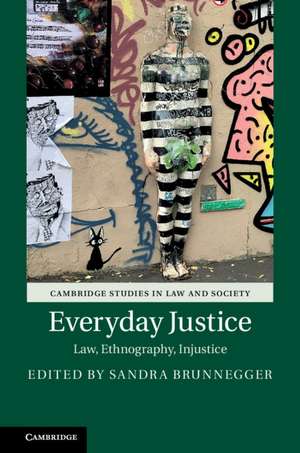Everyday Justice: Law, Ethnography, Injustice: Cambridge Studies in Law and Society
Editat de Sandra Brunneggeren Limba Engleză Hardback – 18 dec 2019
Din seria Cambridge Studies in Law and Society
-
 Preț: 217.44 lei
Preț: 217.44 lei -
 Preț: 233.96 lei
Preț: 233.96 lei -
 Preț: 217.08 lei
Preț: 217.08 lei -
 Preț: 207.99 lei
Preț: 207.99 lei -
 Preț: 168.85 lei
Preț: 168.85 lei -
 Preț: 274.60 lei
Preț: 274.60 lei -
 Preț: 289.76 lei
Preț: 289.76 lei -
 Preț: 237.42 lei
Preț: 237.42 lei -
 Preț: 236.96 lei
Preț: 236.96 lei -
 Preț: 318.50 lei
Preț: 318.50 lei -
 Preț: 290.77 lei
Preț: 290.77 lei - 11%
 Preț: 559.13 lei
Preț: 559.13 lei -
 Preț: 185.40 lei
Preț: 185.40 lei - 9%
 Preț: 661.47 lei
Preț: 661.47 lei - 9%
 Preț: 694.92 lei
Preț: 694.92 lei -
 Preț: 176.91 lei
Preț: 176.91 lei -
 Preț: 177.28 lei
Preț: 177.28 lei -
 Preț: 169.28 lei
Preț: 169.28 lei -
 Preț: 201.39 lei
Preț: 201.39 lei - 9%
 Preț: 695.23 lei
Preț: 695.23 lei -
 Preț: 163.31 lei
Preț: 163.31 lei -
 Preț: 289.76 lei
Preț: 289.76 lei -
 Preț: 279.65 lei
Preț: 279.65 lei -
 Preț: 295.08 lei
Preț: 295.08 lei - 14%
 Preț: 723.92 lei
Preț: 723.92 lei -
 Preț: 375.68 lei
Preț: 375.68 lei -
 Preț: 327.30 lei
Preț: 327.30 lei - 14%
 Preț: 725.57 lei
Preț: 725.57 lei -
 Preț: 392.55 lei
Preț: 392.55 lei - 14%
 Preț: 839.50 lei
Preț: 839.50 lei -
 Preț: 379.07 lei
Preț: 379.07 lei -
 Preț: 429.12 lei
Preț: 429.12 lei -
 Preț: 375.68 lei
Preț: 375.68 lei - 11%
 Preț: 689.87 lei
Preț: 689.87 lei - 11%
 Preț: 694.91 lei
Preț: 694.91 lei - 14%
 Preț: 729.73 lei
Preț: 729.73 lei -
 Preț: 373.56 lei
Preț: 373.56 lei -
 Preț: 422.47 lei
Preț: 422.47 lei - 14%
 Preț: 727.72 lei
Preț: 727.72 lei -
 Preț: 308.12 lei
Preț: 308.12 lei -
 Preț: 398.54 lei
Preț: 398.54 lei - 14%
 Preț: 727.07 lei
Preț: 727.07 lei - 14%
 Preț: 726.42 lei
Preț: 726.42 lei - 14%
 Preț: 781.19 lei
Preț: 781.19 lei - 11%
 Preț: 461.43 lei
Preț: 461.43 lei
Preț: 609.95 lei
Preț vechi: 792.14 lei
-23% Nou
Puncte Express: 915
Preț estimativ în valută:
116.72€ • 120.41$ • 97.40£
116.72€ • 120.41$ • 97.40£
Carte tipărită la comandă
Livrare economică 24-29 martie
Preluare comenzi: 021 569.72.76
Specificații
ISBN-13: 9781108487214
ISBN-10: 1108487211
Pagini: 244
Dimensiuni: 156 x 234 x 17 mm
Greutate: 0.45 kg
Editura: Cambridge University Press
Colecția Cambridge University Press
Seria Cambridge Studies in Law and Society
Locul publicării:Cambridge, United Kingdom
ISBN-10: 1108487211
Pagini: 244
Dimensiuni: 156 x 234 x 17 mm
Greutate: 0.45 kg
Editura: Cambridge University Press
Colecția Cambridge University Press
Seria Cambridge Studies in Law and Society
Locul publicării:Cambridge, United Kingdom
Cuprins
1. Theorizing everyday justice Sandra Brunnegger; Part I. Possibilities of Everyday Justice: 2. Street justice: graffiti and claims-making in urban public space Ronald Niezen; 3. Seeking respect, fairness, and community: low wage migrants, authoritarian regimes and the everyday urban Laavanya Kathiravelu; Part II. The Force of Everyday Justice: 4. 'We don't work for the Serbs, we work for human rights': justice and impartiality in transitional Kosovo Agathe C. Mora; 5. The enduring transition: temporality, human security and competing notions of justice inside and outside of the law in Bosnia and Herzegovina Sari Wastell; Part III. Everyday Justice Unbound: 6. Troubled currents and the contentious moral orderings of Drakes Estero Kathleen M. Sullivan; 7. Everyday justice at the courthouse? Governing lay participation in Argentina's criminal trials Santiago Abel Amietta; 8. Ever in the making: actors and injustice in a Papua New Guinea village court Eve Houghton; 9. Afterword Carol J. Greenhouse.
Recenzii
'Justice is more often felt than grasped intellectually, its everyday contexts accounting for its special bite. In this superb collection of essays the authors demonstrate how those contexts give meaning to local justice and how a sophisticated sense of its presence or absence depends on its socio-cultural surround. These timely studies complement and extend philosophical discussions of justice by showing its centrality to our different ways of experiencing the quotidian world as orderly and fair.' Lawrence Rosen, Princeton University, New Jersey
'In this important volume, Sandra Brunnegger and her colleagues challenge scholars from across the disciplines to rethink how we approach justice. They offer an accessible but sophisticated exemplar of how anthropology can shine a light on the 'muddle' in which writings on justice too often land, caught between the abstractions of theorists and the immediacy of justice practices in everyday life. Especially recommended for legal and political theorists who are interested in expanding their reach, and for sociolegal scholars concerned with integrating the study of justice into empirical research.' Elizabeth Mertz, John and Rylla Bosshard Professor of Law, University of Wisconsin, Madison Law School
'In this important volume, Sandra Brunnegger and her colleagues challenge scholars from across the disciplines to rethink how we approach justice. They offer an accessible but sophisticated exemplar of how anthropology can shine a light on the 'muddle' in which writings on justice too often land, caught between the abstractions of theorists and the immediacy of justice practices in everyday life. Especially recommended for legal and political theorists who are interested in expanding their reach, and for sociolegal scholars concerned with integrating the study of justice into empirical research.' Elizabeth Mertz, John and Rylla Bosshard Professor of Law, University of Wisconsin, Madison Law School
Descriere
Provides rich ethnographic analysis and offers a critical ethnographic approach to justice.
